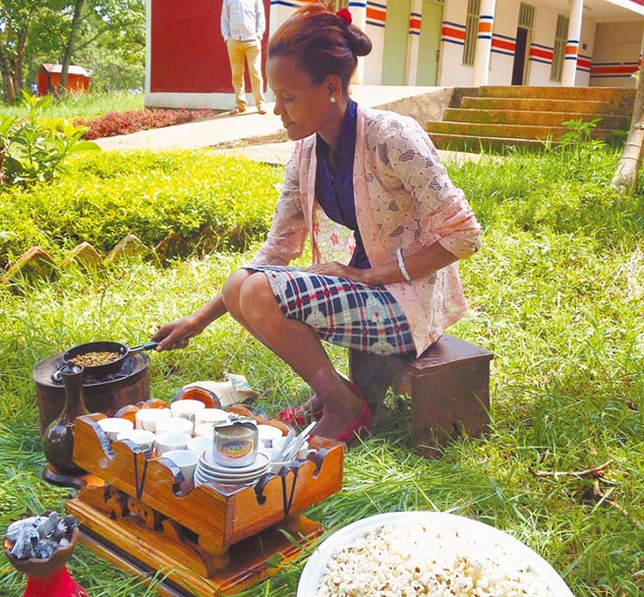To show you Ethiopia, the birthplace of coffee.
In early June, at the invitation of Taiwan's World Vision Association (Vision), I visited Ethiopia. It took nine hours to fly from Tao to Dubai, waiting for a connecting flight for about six hours, and then four hours to arrive in the capital Addis Ababa. Before I set foot on the soil of the country, most of the things that came to mind were poor, barren, skinny children, but when I stopped for four days to see everything, I found that this was not the case.
Ethiopia is the fourth largest economic country in Africa, with more than 3.6 million people in Addis Ababa. The capital Barbolai Airport is one of the largest terminals in Africa. It is a runway about 3800 meters long, the hall is brightly lit, and modern equipment such as customs clearance and security checks are available. After customs clearance, the car headed for the city center. Along the way, nearly one million Japanese imported cars could be seen, and many passers-by were holding smart phones and wearing trendy clothes. The scene completely subverted the old impression and was surprised that they were "not so backward."

However, the "urban sense" only ends in the city center, and the more cars go to the suburbs, the more dishevelled people drive cattle, sheep, horses or donkeys, or those who are prepared to go to the market to sell in exchange for a meagre price for the family; or those who barter for survival, compared with the prosperity of the capital, the gap between the rich and the poor is obvious.
Suffer from drought for many years
Ethiopia has a total area of 1.13 million square kilometers, which is 30 times the size of Taiwan, with a population of about 100 million. More than 10% of the people are suffering from chronic famine, children are severely malnourished and water resources are insufficient, and less than 40% of the population has access to clean drinking water. only 20% of the people have clean sanitation facilities; except for the capital, most people live in thatched huts and go to the toilet in the open air. In recent years, the climate is abnormal, the southeast of the country has been dry for four years, and the crops have almost failed, resulting in the growth retardation and near death of children under the age of five.
Agriculture is the foundation of the country, and more than 80% of the people work in agriculture, but they have been suffering from drought for many years. In recent years, the harvest is simply not enough for the whole family, nor can they buy other necessities of life. In addition, important measures such as schools and hospitals have been built in the capital. Many people simply cannot receive normal medical care. There is little electricity outside the capital, and most people rely on firewood to cook food. In case of rain, more than half of the country's roads are unable to drive vehicles because the streets are muddy without asphalt and the environment is bad.
Taste the authentic Ingera.
Ethiopia is the "birthplace of coffee". There is a local custom that no matter how poor people are, they must have a coffee pot and a charcoal stove at home to cook coffee at any time. When you come here, it is not difficult to find that a waiter will hand over coffee after every meal. Compared with the taste of coffee in Taiwan, the aroma here is not strong, bitter but not astringent, mild and refreshing to drink, not a general flavor. In addition, local people's traditional staple food Injera (Ingera), which looks like a spongy pancake, can wrap meat, eggs or beans in the cake. It tastes sour and tastes like lemon juice sprinkled on the crust, which is deeply loved by locals, but almost all outsiders are not used to it. If you have a chance to visit, you can try this authentic taste.
Africa is a red earth that many people have never set foot on in their lives, full of fantasies and legends, perhaps because of national conditions and folkways, covered with a mysterious veil, waiting for outsiders to explore the truth. If you can afford it and are well prepared in advance, come to Ethiopia to see how the local people show their strong vitality in a harsh environment and simply pull out the river of life for survival and nature. Maybe after this journey, your ideas and values will change, and you will cherish all the people and things around you more.
Important Notice :
前街咖啡 FrontStreet Coffee has moved to new addredd:
FrontStreet Coffee Address: 315,Donghua East Road,GuangZhou
Tel:020 38364473
- Prev

The wonderful use of leftover coffee
Follow the caf é (vdailycom on Wechat official account) and found that the good Cafe opened a small shop of its own refrigerator to remove the odor. If the refrigerator has a bad smell, you can put some coffee powder in it for 1 to 2 days, and the coffee will absorb the stench. Massage to reduce fat, mix coffee and essential oil on the skin, then massage in a circle, rinse after a few minutes. Glossy hair after washing the hair, set the
- Next

Hundreds of unmanned stores are waiting to open. Ali is still blowing a gust of wind to promote the industry.
Follow Kaibei (Wechat official account vdailycom) found that Beautiful Cafe opened a small store of its own in 2017, known as the Lunar New year of unmanned convenience stores. Recently, Alibaba's unmanned convenience store Amoy Coffee was unveiled in Hangzhou, detonating a new scene of artificial intelligence payment. For a while, unmanned convenience stores received unprecedented attention, and news of industry financing followed. In this
Related
- The ceremony is full! Starbucks starts to cut the ribbon at a complimentary coffee station?!
- A whole Michelin meal?! Lucky launches the new "Small Butter Apple Crispy Latte"
- Three tips for adjusting espresso on rainy days! Quickly find the right water temperature, powder, and grinding ratio for espresso!
- How much hot water does it take to brew hanging ear coffee? How does it taste best? Can hot water from the water dispenser be used to make ear drip coffee?
- What grade does Jamaica Blue Mountain No. 1 coffee belong to and how to drink it better? What is the highest grade of Blue Mountain coffee for coffee aristocrats?
- What are the flavor characteristics of the world-famous coffee Blue Mountain No. 1 Golden Mantelin? What are the characteristics of deep-roasted bitter coffee?
- Can I make coffee a second time in an Italian hand-brewed mocha pot? Why can't coffee be brewed several times like tea leaves?
- Hand-brewed coffee flows with a knife and a tornado. How to brew it? What is the proportion of grinding water and water temperature divided into?
- What is the difference between Indonesian Sumatra Mantinin coffee and gold Mantinin? How to distinguish between real and fake golden Mantelin coffee?
- What does bypass mean in coffee? Why can hand-brewed coffee and water make it better?

